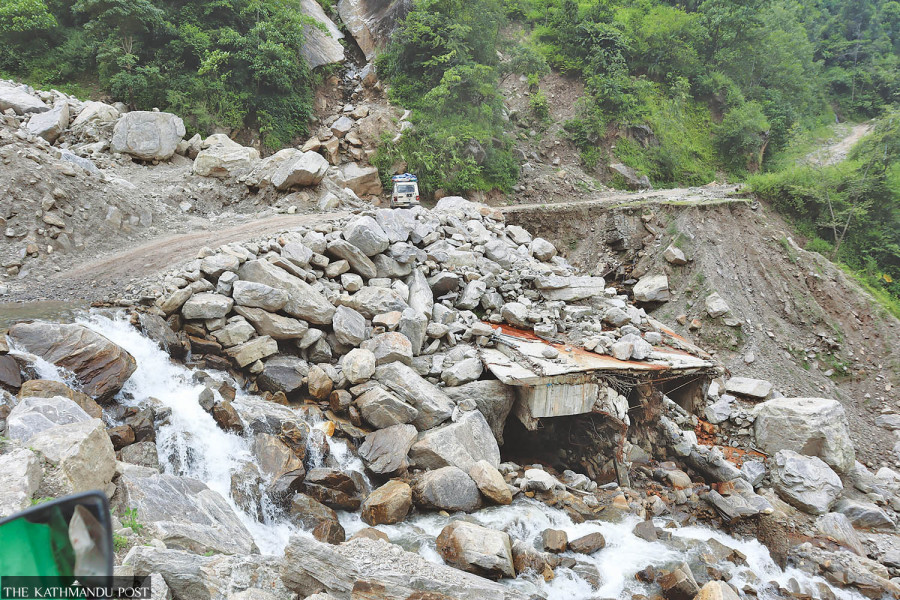Koshi Province
Panchthar’s Chiwabhanjyang-Darimba road crumbling due to contractor’s neglect
Of the 114 km of the Mid-Hill Highway in Panchthar district, 63 km has been blacktopped, but 51 km from Chiwabhanjyang to Darimba remains incomplete despite several deadline extensions.
Laxmi Gautam
The Chiwabhanjyang-Darimba road, the easternmost section of the Mid-Hill Highway in Panchthar district, was supposed to be upgraded and blacktopped by April 2022. But the contractor, Roshan Shiva Shakti JV, failed to even start the work by deadline. Although the project’s deadline was first extended to July 2024, progress was almost zero.
The road project extended the deadline for a second time, now by an additional one year. Yet, the construction company has not brought the necessary tools, equipment and manpower.
“There are only a handful of workers in some places along the road section making gabion nets. But the number of workers is not enough to complete the road project within the new deadline,” said Bhim Bahadur Yongya, the chairman of Yangbarak Rural Municipality. He criticised the contractor for continued neglect.
The Tharpu-Chiwabhanjyang road along the 51-km Chiwabhanjyang-Darimba section is now in a sorry state. Landslides have blocked the road in several places, while other areas have caved in. The road is muddy and riddled with potholes.
“Travelling along the Chiwabhanjyang-Darimba road has been quite risky due to the negligence of the contractor,” said Yongya. It now takes almost a full day to cover the 51 kilometres from Chiwabhanjyang to Darimba.
The construction of Pushpalal Mid-Hill Highway began in the fiscal year 2007-08 with an aim to complete the national pride project by 2017-18. Stretching 1,879 kilometres, the highway connects Chiwabhanjyang of Panchthar in the east to Jhulaghat of Baitadi in the farwest of the country.
Out of the total 114 kilometres of the highway in Panchthar, 63 kilometres have already been blacktopped. The remaining 51 kilometres, between Chiwabhanjyang and Darimba road remain in limbo.
The Mid-Hill Highway Project had signed an agreement with Roshan Shiva Shakti JV in 2020 to widen and blacktop the 51-km stretch within two years, with a budget of Rs1.25 billion. “However, progress has been sluggish, with only about 20 percent completed over multiple deadlines,” said Raj Narayan Sardar, information officer at Phidim office of the Mid-Hill Highway Project.
The Chiwabhanjyang-Darimba road was barely motorable till mid-June. Travellers face significant risks due to the lack of roadside drainage, with water flowing over the road and making conditions worse. The situation worsened when floods on June 16 swept away bridges in the Oyam, Osam and Phalamkhola streams. The floods and landslides triggered by heavy rains damaged the road sections at several places, making travel full of risks.
“Before the monsoon, it took around two hours to travel along the 21-km Tharpu-Chyangthapu road. Now it takes almost 10 hours” said Mohan Limbu, a regular driver.
Due to the poor condition of the road, the Tharpu-Chyangthapu section has become accident-prone. Road mishaps are reported quite frequently mainly during the rainy season. “The contractor left the work incomplete along the road section. Road accidents occur almost every day here,” said Bigyan Prasai of ward 3 of Yangbarak. He sustained serious injuries when his motorcycle met with an accident a few weeks ago. “The dilapidated Chiwabhanjyang-Darimba road has also been a major obstacle to carrying out other development activities,” said Prasain.
The road upgrade work began by dividing the Darimba–Chiwabhanjyang stretch into three sections. Vehicles run along the recently gravelled Darimba–Chyangthapu road section, but driving along the 30 km from Chyangthapu to the Nepal-India border is dangerous due to the poor condition of the road.
The border outpost of the Armed Police Force (APF) at Chiwabhanjyang has a tough time transporting food and other essentials due to the poor condition of the road. People who keep yak and sheep sheds in the Chiwa area, which lies at an altitude of around 3,200 metres, also face difficulties managing food and supplying their products.




 9.88°C Kathmandu
9.88°C Kathmandu















